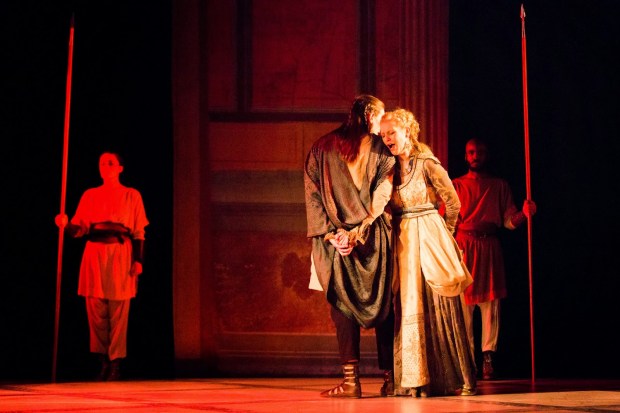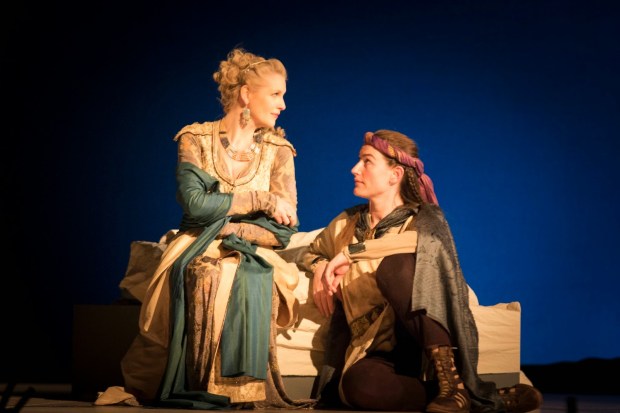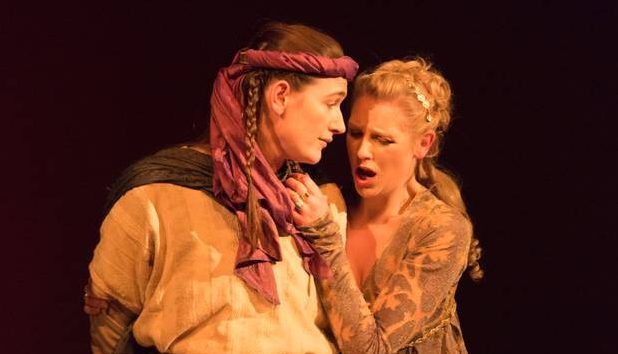★★★★
(Classical Opera, conducted by Ian Page, Britten Theatre, 18 April 2015)
As Hadrian is one of my historical favourites, I was amused to discover that he’s the subject of a Metastasio libretto, set to music by more than sixty composers between 1732 and 1828. Classical Opera’s production is, rather remarkably, the first staging of the version by J.C. Bach (son of the Bach) since it opened in London in 1765. It’s been making waves in the press: the dominant reaction is amazement that we don’t hear more of J.C., especially since he spent most of his career in London* and was much admired.
One of his greatest fans was a precociously talented child who happened to be visiting London in 1765 when Adriano had its premiere, with Giovanni Manzuoli singing Farnaspe and Tenducci singing Adriano. Young Wolfgang Amadeus Mozart almost certainly went to one of the performances (indeed, it was probably a birthday present since he turned nine the day after the premiere), and Bach had a profound impact on him. One of the most striking aspects of Adriano is how much like Mozart it can sound (or, to be more accurate, how much Mozart can sound like it).
Characteristically, Metastasio’s libretto flirts with history without committing itself. It’s based on the time Hadrian spent as interim governor in Syria after Trajan’s subjection of Parthia: he was still in Syria when news came of Trajan’s death and his own succession to the throne. Beyond that, the plot is pure Baroque fantasy.** Adriano (Hadrian) is enamoured of his captive, the Parthian princess Emirena, but she is already in love with the prince Farnaspe, one of her father Osroa’s vassals. When Farnaspe comes to Adriano’s court to beg the return of his fiancee, Adriano invites Emirena to make her feelings known. But she has been advised by the Emperor’s officer Aquilio to conceal her affection for Farnaspe, so as to avoid angering Adriano. (Aquilio has reasons of his own for trying to push Emirena into Adriano’s arms.) Faced with his beloved’s coldness, Farnaspe is horrified; but Adriano is delighted, believing there might finally be hope for his own suit.
But there’s one little detail the Emperor has forgotten about. What of his own fiancee, Sabina? Unfortunately for him, Sabina has come posthaste from Rome to congratulate him and arrives, with impeccable timing, just in time to spoil Adriano’s fun (unaware that poor Aquilio nurtures a hopeless love for her). She isn’t the only inconvenient visitor to the court. One of Farnaspe’s companions is the disguised Osroa, who burns to avenge the conquest of his people by striking at the heart of Rome. And so, as the young people work themselves up into a romantic tangle, Osroa occupies himself with his own plots: setting fire to the imperial palace and, if luck is on his side, perhaps even cutting down the Emperor himself.
The plot is occasionally clunky. I’m not sure whether I should blame Metastasio for this or Bach himself, since I read that he chopped and changed some of the original libretto. After all, Adriano offers to return Emirena to Farnaspe in Act 1 and it’s only because she follows Aquilio’s (unconvincing) advice to hide her love that we get a further two hours of romantic tribulation. There are parts which really didn’t feel much like Metastasio: the duet between Farnaspe and Emirena at the end of Act 1, for example, for all the melting beauty of its music, sounded too sentimental, but perhaps that was just the translation. Some parts, however, were pure Metastasio, to the point that there was quite a serious sense of déjà vu. Running around setting fire to royal palaces was clearly as popular a pastime under Hadrian as it was under Titus; and Adriano perpetuates the eternal Metastasian truth that, if you go to meet your girlfriend in a garden, someone will inconveniently turn up with a bloody sword and give it to you, resulting in your immediate and entirely undeserved arrest.
Visually everything was splendid. The director Thomas Guthrie and designer Rhys Jarman should both be congratulated. The simple backdrop screen was lit with gradients of blue or gold, against which colonnaded palaces, trees and statues appeared in silhouette. Paved in mosaic, the set was dominated by a fluted column, broken off at the stump in the first act, which grew taller with every act, twined about with vines. Interior scenes were gorgeously fitted out with bronze incense stands, flambeaux and hanging cloths showing Roman frescoes. The costumes were perfect: late antique, with a Near Eastern flavour rather than the standard-issue togas you usually see in Classical productions. There was, appropriately, more of Byzantium than Julius Caesar here. Aesthetically, I was in my element; though as the whole production goes, there were a couple of things which grated. One of these was the puppet birds. They were an attractive conceit and I liked their first appearance, but I think that should have been it. I could quite happily have dispensed with them entirely in the second act, where they proved to be an unfortunate distraction from a couple of really very beautiful arias. The other slight problem was the fact that no one seemed quite sure what to do during the introductions to the arias: the action of the recitative would be over and the poor singers sometimes looked a little stranded, left with nothing to do but stroll around the stage waiting for the words to start again.

Farnaspe (Erica Eloff) and Emirena (Ellie Laugharne)
While all the singers were strong, some had more opportunity to show off than others; Nick Pritchard (Aquilio) was restricted to only one aria in Act 3, though this was beautifully done; and Rowan Hellier’s eponymous Adriano had only a couple of moments to shine, fewer than usual (it seemed) even for a title character. One of her arias, however, was the rather wonderful Tutti nemici e rei: she turned in an impressive vocal performance as her Adriano stalked back and forth between his Parthian captives, practically incandescent with rage. As the vengeful Osroa, Stuart Jackson had a little more stage time: I enjoyed the warm burr of his voice and the lightness of touch that he brought to his coloratura, though in the first two acts I’d have liked a touch more drama and vocal power (we were in the Upper Circle and he was occasionally on the quiet side). In Act 3, however, he turned in a tour-de-force with the splendidly defiant aria Non ritrova un’ alma forte, in which he gave me a glimpse of the real Osroa: noble, proud and determined rather than simply an obstreperous baddie.
Filipa van Eck impressed as Sabina, with a powerful, supple voice which easily tackled some very Mozartian flights of notes, as in Act 1’s impressive Numi, se giusti siete (she also had one of the loveliest costumes, with a billowing mantle of Tyrian purple). Part of me wishes that Bach had taken the chance to give Sabina a full-on angry aria of the ‘miffed princess’ variety, because she certainly had plenty of cause and I think van Eck might have handled it rather beautifully. Another time, perhaps. Her rival in love was Ellie Laugharne’s Emirena (equally finely turned out in cream and gold), whose more delicate soprano proved to have a truly sparkling command of coloratura. Crucially for this role, Laugharne was also a strong actress: I say ‘crucially’ because Emirena and Farnaspe aren’t, on paper, the most gripping pair of operatic lovers I’ve encountered. It’d be easy for the characters to come across as a bit bland: the fact they didn’t is a testament to the singers’ acting. Laugharne’s Emirena was thoroughly, convincingly besotted with her beloved (once she’d stopped playing cold), and one of the highlights for me was the duet Se non ti moro at the end of Act 1: an intimate intertwining of desperation, hope and resolution, performed with complete conviction by both parties.
But, of course, it takes two to duet; and the revelation of Adriano was Erica Eloff’s Farnaspe. Now, it’s true that she shouldn’t have been a revelation: I saw her Marzia in Catone a month ago and was impressed with her then; but while I liked her ice-queen Marzia, I was utterly captivated by her Farnaspe. Like most of Metastasio’s heroes, Farnaspe is a lover at heart and is more inclined to sit bemoaning his outcast fate than actually doing anything; and the danger is that he could seem a bit wet, but Eloff gave him a completely plausible blend of inner nobility and youthful nervousness. She turns out to be remarkably good at trouser roles, perhaps helped by her statuesque height: she moved and stood like a slightly gauche young man, and her chemistry with Laugharne was thoroughly believable.
I know Eloff can do crazy coloratura with ease, thanks to her Vo solcando in Catone, but she didn’t have as much chance to show that off here (there was the obligatory storm-at-sea aria in the form of Disperato in mar turbato, but it’s not quite the same). Instead she had some absolutely gorgeous romantic arias, and proved to be just as good at those as she is at the bravura, which is no mean feat. There was the duet, of course, but Farnaspe’s big moment in Adriano is the famous aria Cara la dolce fiamma. I know this through Philippe Jaroussky‘s recording and I can say, hand on heart, with no hesitation at all, that Eloff absolutely left him in the dust, with a long opening note of such delicacy that it suddenly swelled above the music before I’d even realised that it had started. Meticulous control blended with such gentleness and emotional conviction that I found myself getting slightly misty-eyed and, about halfway through, I decided that was that: whenever Eloff does anything Baroque from now on, I’m going to be there if it’s humanly possible.
And so, overall, an excellent night, beautifully designed and finely sung all round. I think Bach is going to require some further study on my part; I like what I’ve heard very much, and this was an ideal introduction both to his work and to the opera itself. It’s only a shame that more people aren’t going to get to see it, especially because there really aren’t that many production photos available (yet?). However, with cameras and recording equipment in the house, I can’t help hoping that this means either a DVD or CD is in the works; and if one is ever released, I’d recommend it wholeheartedly. For now, you can get another point of view on the production at Opera innit (Dehggial was there on the 16th), and if you fancy listening to the music for yourself, there are recordings of other productions on YouTube. Those who enjoy compare-and-contrast might like to know that Eloff will be making a return as Farnaspe in Giovanni Battista Pergolesi’s version of Adriano in the autumn. Now that’s something to look forward to…
* And thus, like Handel, is obviously basically English.*** Only now do I discover, via Planet Hugill, that University College Opera put on Bach’s Amadis de Gaule just a few weeks ago. J.C.’s star is obviously in the ascendant; and long may it last.
** Hadrian was, very famously, not keen on girls.
*** N.B. Tongue firmly in cheek (before I get indignant emails from people living in Halle).

Emirena (Ellie Laugharne) and Farnaspe (Erica Eloff)






How strange to hear that you had trouble hearing Jackson. I was in the Dress Circle and had no problem whatsoever. Maybe that's why I thought van Eck was too loud… Definitely the long note in the intro to Cara la dolce fiamma was wonderfully done. I still remember it!
It wasn't that I couldn't hear him at all, just to clarify. He only sounded quiet compared to the others. And it wasn't a big problem: it's just that his voice is rather nice so I would have loved to have it just that bit more forceful so I could savour it properly. And a bit more swagger in the acting, although that might be my penchant for cloak-swirling and moustache-twirling coming through. Of course, as regards the sound, maybe I should just stump up a bit more and go down in the Dress Circle next time. Actually, next time will be Xerxes in July… looking forward to that. (That'll be… oooh, Xerxes no. 3) 😉
Interesting, I thought there was enough swagger although perhaps more sturdiness than swagger per se. To me he did come off as someone you didn't want to screw with, which seemed about right for a Parthian king.
Well such an excellent comments on the subject; I’m so impressed!!!